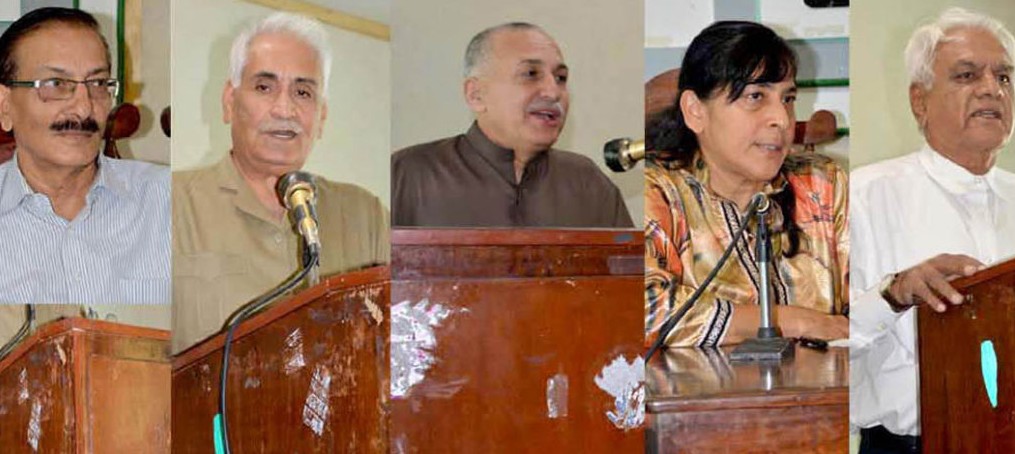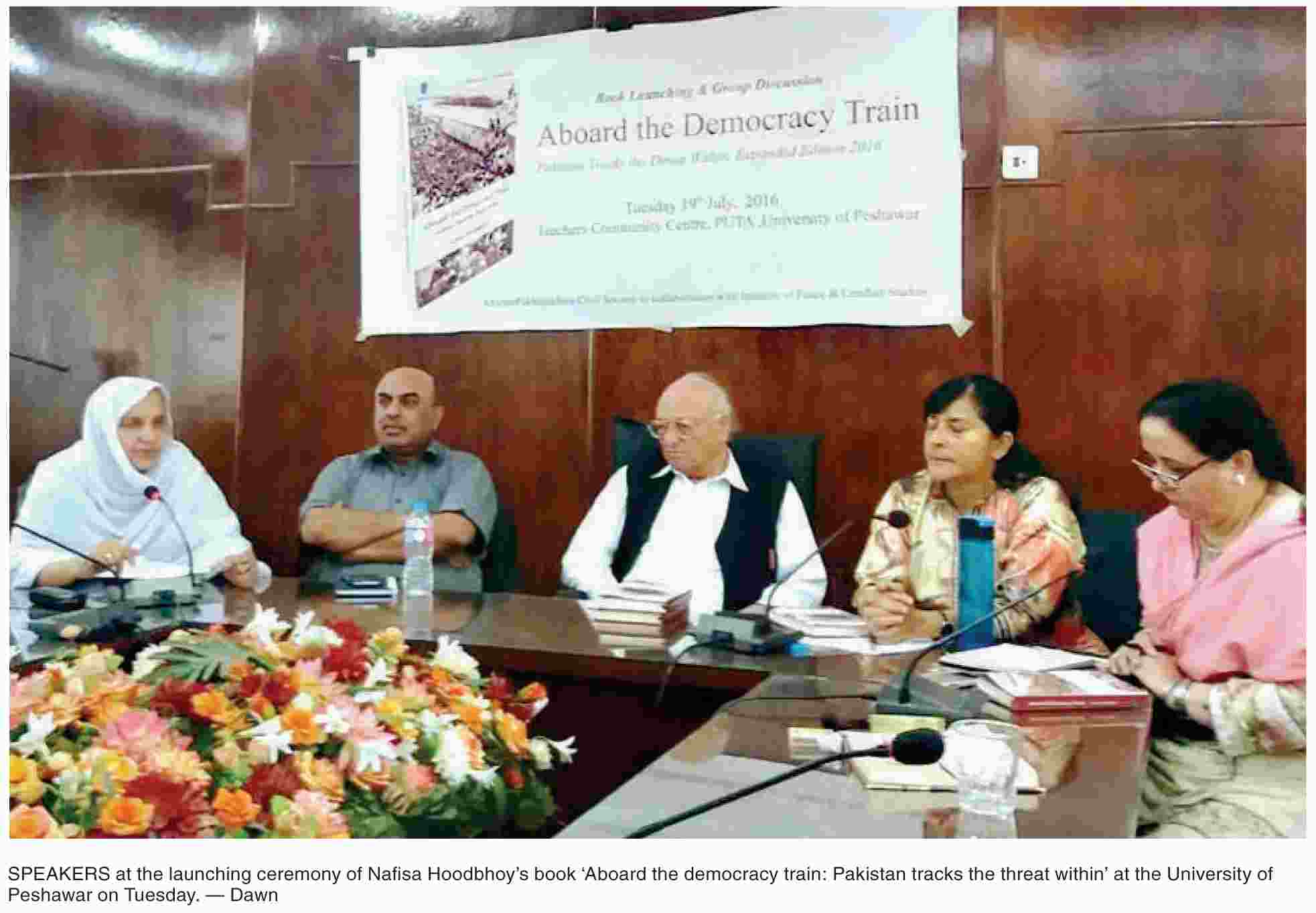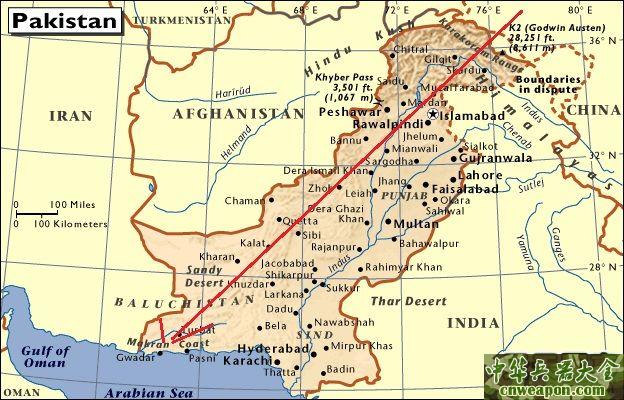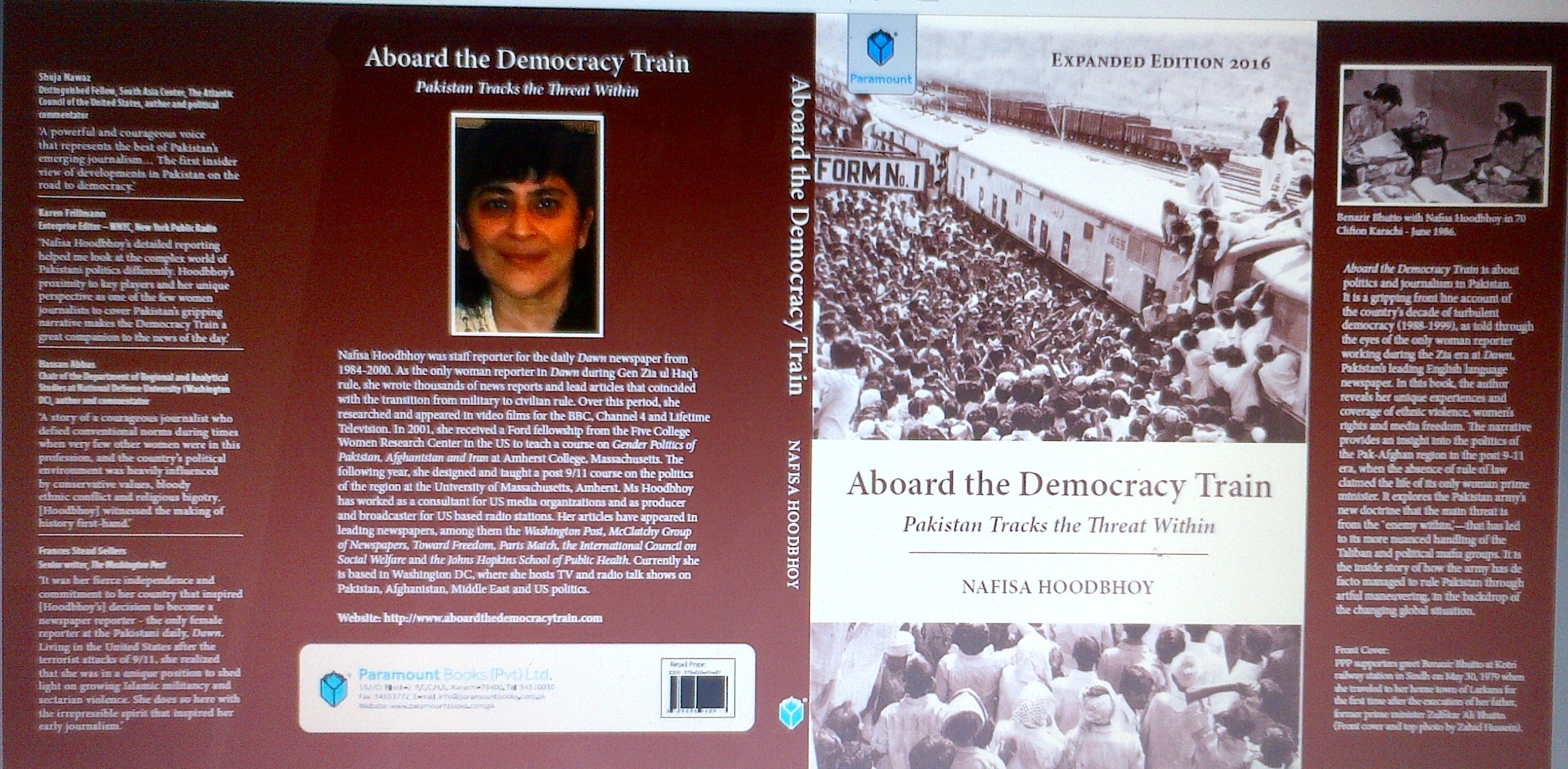
Democracy was Derailed through Conspiracies

BALOCHISTAN TIMES July 22nd, 2016
2016 Edition of ‘Democracy Train’ Launched in Pakistan
The 2016 expanded edition of Aboard the Democracy Train has been successfully launched in Pakistan with a new sub-title, `Pakistan Tracks the Threat Within.’ The book brings readers up to speed with significant changes that have occurred in the region over the last few years. Continue reading “2016 Edition of ‘Democracy Train’ Launched in Pakistan”
Nafisa Hoodbhoy’s book launched in Quetta also
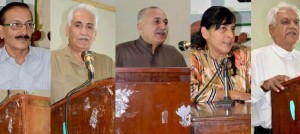
QUETTA: The 2016 Expanded Edition of “Aboard the Democracy Train, Pakistan Tracks the Threat Within” was launched on July 21 at Quetta Press Club Quetta.
Speakers at the book launching ceremony said it was preplanned to distort the essence of democracy in the country, which is why the people showed aversion to democracy and politics.
Through infiltration in ethnic, religious and political groups ‘ideological politics’ in Pakistan was distorted, as result of it democracy failed to develop in the country, they said.
Nafisa Hoodbhoy said that in the present expanded addition she included the latest events especially related to terrorism, including Peshawar Army Public School carnage and China-Pakistan Economic Corridor (CPEC).
She said: “If CPEC proves a game changer, it will help prosper the Baloch youth economically by getting jobs. If the Baloch people were deemed security issues and their reservations not resolved, it will further worsen the situation.”
Veteran Journalist Siddiq Baloch said the people have been befooled in the name of CPEC, which, according to him, was being used as a propaganda tool.
Former Balochistan Chief Secretary Hakim Baloch said that with the help of Muslims’ votes Pakistan was democratically created. Despite it, the people’s representation was not respected following the creation of Pakistan. As a result, he said, politics, politicians and democracy all have become victims of terrorism.
Mr. Hakim Baloch further added, “After the 1946’s and 1971’s fair, free, and transparent elections, the confused policy makers of the country decided not to conduct free elections anymore, and this practice is continued to this day. Resultantly, Pakistan has failed to develop a stable democracy. Also, due to manipulation of elections and intervention in the political process, political parties had to face disintegration in the country.”
Former Finance Secretary Mahfooz Ali Khan said the people of Gwadar are deprived of their basic amenities, especially water. With the CPEC, the government should also resolve the issues of the people of Gwadar.
“Following the attack on the Army Public School, restrictions on the Press have also increased, as well journalists have to self-censor while filing stories.”
“Although CPEC is being introduced as a game change, it is in reality not so. Instead, it is only being highlighted to divert the people’s attention from the sinking economy,” said Siddiq Baluch.
He also regretted that out of 1600 only 400 megawatt electricity is being given to the people of Balochistan, which is injustice with the people of Balochistan. Besides it, he said, gas was discovered in Balochistan in 1952, and to this day 29 districts of Balochistan are still deprived of it.
Munir Badini, a prolific Baloch author and former Secretary of Education Department said: “Intolerance and extremism are on the rise in the country, which has brought havoc to the country.”
“Balochistan makes half of Pakistan, and if Balochistan remains backward is meant that half of Pakistan is backward,” said Siddiq Baloch.
Lauding the author, Mr. Badini said the author has wonderfully and meticulously brought to fore the issues of all provinces of Pakistan in her book, and for the first time in Balochistan an author has come out of the province to launch the book here.
Aboard the Democracy Train: Book Launched in Quetta

Quetta, July 22: “Aboard the Democracy Train” book authored by Nafisa Hoodbhoy was launched in a ceremony held in Quetta Press Club, on Thursday.
The book is about the journey of democracy in Pakistan and senior Journalist Nafisa Hoodbhoy has noted down her experiences while travelling in train with political leaders such as Late Benazir Bhutto at different points in time.
Nafisa Hoodbhoy, addressing the ceremony, said that people should be provided a chance to participate in maintaining a true democracy. “Politicians need to show the reality and truth to the masses about democracy,” she said.
People should be provided a chance to participate in maintaining a true democracy – Nafisa Hoodbhoy
She urged media to differentiate between right and wrong for a good and long term sustainable democracy.
Shahzada Zulfiqar, President of Quetta Press Club, said that Journey and exposure are very important for a journalist to point out the reality during professional reporting.
Mr. Zulfiqar further added that Media plays an important role in different fields of life and this book is a great contribution in providing information which can be used by the researchers.
Mr. Munir Ahmed Badini, Former Secretary Education and Balochi and Brahvi literary figure, said that the Book needs to be read attentively and deeply to understand the pulse of it.
Mr. Badini lamented that some people are imposing their views using violence and use of force which is not a good idea and needs to be condemned.
Baloch are people of this country and considering them just a security issue will be very dangerous – Siddique Baloch
Siddique Baloch, Senior Journalist said that Nafisa is one of the senior journalists and she has defined very well the culture and deprivation of people of Balochistan.
He further added “Baloch are people of this country and considering them just a security issue will be very dangerous.”
Hakeem Baloch, former Chief Secretary Balochistan, said that ethnic diversity of Karachi and Sindh culture is very well defined by the author of Book.
People from different sections in society attended the launching ceremony in large numbers.
Speakers call for alternative narrative to establish tolerant society
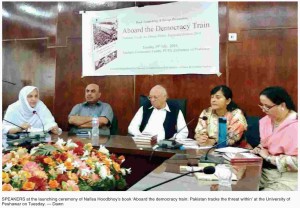 PESHAWAR, July 19: Speakers at a book launching ceremony here on Tuesday said that the state narrative in the country only promoted extremism and intolerance in the society.
PESHAWAR, July 19: Speakers at a book launching ceremony here on Tuesday said that the state narrative in the country only promoted extremism and intolerance in the society.
There was dire need of an alternate narrative by the civil society and political forces to establish a tolerant and peaceful society where people of different faiths could enjoy equal rights, they said.
The 2016 expanded edition of “Aboard the Democracy Train: Pakistan Tracks the Threat Within” by Nafisa Hoodbhoy was lunched at University of Peshawar under the auspices of Institute of Peace and Conflict Studies.
The author, a senior journalist, said that as the only woman reporter in Pakistan’s leading Dawn newspaper from 1984 till 2000, she was curious about the connection between day to day events and stored them in memory to tell the world some day about the larger picture.
She said that initially the book was published with a sub-title “A journey through Pakistan’s last decade of democracy” and it was a frontline account of the country’s decade of turbulent democracy from 1988 till 1999.
Ms Hoodbhoy said that in the present expanded addition she had included the latest events especially related to terrorism including Peshawar Army Public School carnage and China-Pakistan Economic Corridor (CPEC).
Lauding the author’s approach, senior advocate and former MNA Abdul Lateef Afridi said that she had attempted to approach Pakistan’s history with a fresh view instead of the existing state narrative taught since decades in educational institutions in the shape of Pakistan Studies.
“Unfortunately Pakistan had no history before 1947 and the history was that of the nationalities living here including Punjabis, Pashtuns, Bengalis, etc.
However, a narrative was developed by the state trying to compel these nationalities to stop talking about their culture and history and they should consider that their history only started with the creation of Pakistan,” he said.
Mr Afridi said that the state narrative was based on religious lines which taught people that the members of other faiths were their enemies.
He said that ANP was the only party having a clear stand against militants as hundreds of its leaders and workers were killed, but still the establishment and a mindset developed by it was not willing to award certificate of patriotism to them.
He said that organisations like Jumat ud Dawah were openly holding public meetings and declaring those people, who did not share their ideology, as traitors. It showed that the state was still not willing to change its narrative, he added.
Shahana Ajoon, the mother of a killed student of APS, said that all the mothers of the killed students had raised several pertinent questions but so far they had not been given answers by the government regarding the incident.
She asked as to why hundreds of students were gathered at the main auditorium of the school when there was a specific threat to the institution.
Provincial chief of National Party Mukhtar Bacha raised the question whether existing social contract, which had bound the people, had resolved the issues in the country.
He said that soon after creation of Pakistan the Objective Resolution was passed and subsequently it was made part of the Constitution thus dividing the country on religious lines.
Mr Bacha said that they needed to start discussion for a new social contract, which should be based on scientific and sociological norms rather than intolerance and hate.
He added that the issues of class difference, democracy and sectarianism should be addressed in the new contract.
“We need a counter narrative to that of the state and the author had tried to provide that narrative in her book,” he said.
Strengthening Participatory Organisations chief executive Naseer Memon said that there were several problems plaguing the country.
He said that they were not ready to accept identities of different nationalities. He said state was dealing only with symptoms of terrorism instead of its causes, which were inherent in the state narrative.
Pakhtunkhwa Olasi Tehreek leader Dr Said Alam Mehsud said that not a single political party had demanded independent judicial inquiry into APS carnage as they were stopped by the security forces from doing do.
He added that on June 15 a standing committee of Senate demanded that CPEC should be under Council of Common Interests instead of Planning Commission, but media did not give coverage to it as they were stopped by certain quarters from doing so.
Women rights activist Rukhshanda Naz, who also moderated the programme, and head of Khawendo Kor Maryam Bibi said that the author had not ignored gender perspective while writing the book and had also included in it the miseries of women during militancy.
Published in Dawn, July 20th, 2016
First Launch of 2016 Edition in Peshawar University on July 19

Peshawar has been selected as the venue for the launch of the book because of the city’s front line role in the Afghan war. In this current edition, the book addresses how the horrific attack on Army Public School, Peshawar brought into sharp focus the long standing relationship of Pakistan’s army with the Taliban.
The event will be held at Teachers Community Center, University of Peshawar between 3-5 pm.
For more information contact Literary Secretary, Noor Sanauddin
Next, the Expanded `Train’ Travels to Quetta
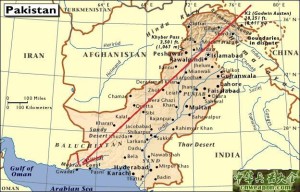
Next, the book’s expanded edition – bearing the sub-title `Pakistan Tracks the Threat Within,’ – will be launched on July 21 in Quetta Press Club. The event will be addressed by political figures, civil servants and the intelligentsia.
Quetta has been selected as the venue for the launch because of the economic opportunities being offered in Balochistan by China, via its investment in Gwadar Port and the economic corridor it is building through Pakistan.
In its updated edition, the book reveals how Balochistan’s notriety in hiding the Afghan Taliban, fighting the Afghan government next door, may be gradually phased out and replaced by training and economic opportunities for the neglected people of the province.
For more information, contact Asian Development Organization chairman, Riaz Raisani at Sarawaan@gmail.com
Watch this Space for Info on Launch of Expanded Edition
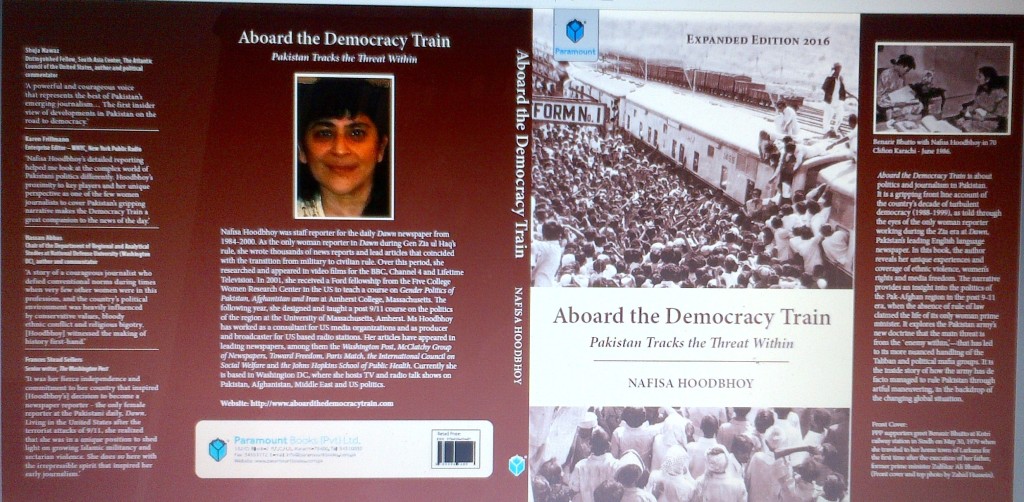
‘Aboard the Democracy Train is ‘key book’ on topic’ – Vikas Datta
Another perceptive look into an embattled country and where Ms. Hoodbhoy scores is starting much earlier in a more dangerous decade which has however not got its adequate share of attention due to the lesser outward manifestations of violence, save in benighted Karachi and Sindh…. One little disconcerting issue is that in the post-9/11 account, all the personal touches disappear and it is all bald fact, incisive no doubt, but doesn’t tell much about the author’s own experiences and thoughts. Overall, a key book which must be read by anyone interested in the topic and find where and how the problems came up…

